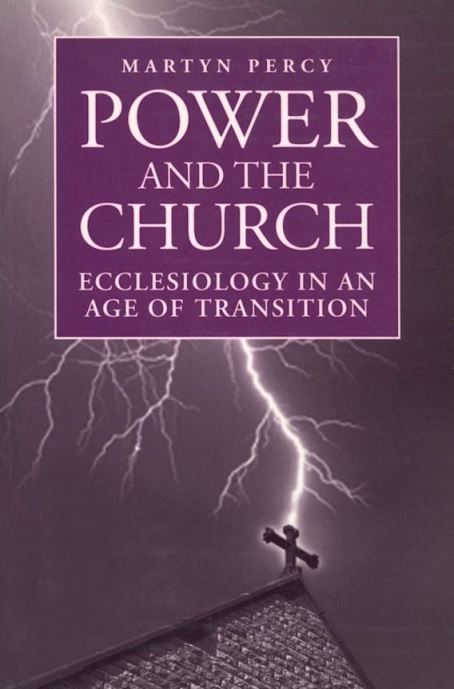Martyn Percy: Power and the Church
 Martyn Percy, Power and the Church: Ecclesiology in an Age of Transition (London and Herndon, Va.: Cassell, 1998), xv + 239 pages, ISBN 9780304701070.
Martyn Percy, Power and the Church: Ecclesiology in an Age of Transition (London and Herndon, Va.: Cassell, 1998), xv + 239 pages, ISBN 9780304701070.
Widely published in the area of conservative religion in general and conservative Christianity in particular, theologian Martyn Percy turns in this book to questions concerning the nature of power in the church. Whereas chapter one discusses various models for understanding power in religion, chapters two and three proceed to analyze power in the New Testament. Two controversial arguments are advanced: first, that the healings and miracles of Jesus are intended not first and foremost as benefits for believers (as understood by upper middle class Euroamerican Christians in general and by Prosperity Gospelers specifically) but as signs of the gospel directed toward the outsider, the poor and the needy—the “politically, socially and religiously disadvantaged” (p. 28) as Percy puts it; and second, that apostolic power in the early Church is understood best in terms of wisdom and weakness.
Other chapters proceed to analyze the notion of power in as it operates in fundamentalistic Christianity (of which Percy includes—even if finally problematically in this reviewer’s perspective—Pentecostalism and the charismatic movement); the nature of power expressed as violence in new religious movements; the idea of pilgrimage as seen in the Toronto Blessing phenomenon, particularly the ways in which spiritual power becomes a commodity that is acquired through certain practices in this framework; the bureaucratization of power in Anglicanism (Percy’s own church); the embodied, somatic and even erotic nature of power as experienced in Pentecostal-charismatic Christianity in general and in the Pentecostal-charismatic worship experience in particular; the uneven and gendered distribution of power in the increasingly pluralizing Anglican tradition; and the perpetuation of power in experiential religion through the ideology of anti-intellectualism which discourages critical questioning in order to support the status quo.
An introduction and a conclusion round out this volume of previously published and collected essays. In the conclusion, Percy devotes a section to suggesting an alternative theological account of divine power than that discussed in the book: process theology’s emphasis on God working through luring rather than directly. But this complicates Percy’s task and raises questions about who his intended audience is. Mainline Protestants sympathetic to the process theological vision are going to have to work hard to get through all the chapters on the Pentecostal-charismatic movement, and Pentecostals and charismatics who may stand to gain something from Percy’s analyses will be put off by his recoursing to process theology at the end. The other critical question concerns the “ecclesiology” (doctrine of the church) in the book’s title and subtitle, which does not receive substantive elaboration. Percy’s focus ultimately falls on attempting to understand power in religion, and he does not set out a coherent statement about power in the Church as readers are initially led to believe. Hints in the conclusion are that Percy advocates embracing some sort of postmodern identity for Christianity, and hence also for ecclesiology. Is this simply because of the preference for plurality and diversity? What does this mean for the future of Roman Catholic Christianity, then (mentioned only in passing in a few places in the volume)? Here would be material for case studies which would have complemented the volume. But perhaps that could be the topic of a future book on religion and power.
It is clear that Percy is at home with sociological and phenomenological analyses as he is with theological assessment. But do not be mistaken: there is plenty of theological meat in these pages for perceptive theological readers. While readers of this journal will certainly note even from this brief summary that Percy’s perspective and agenda with regard to the Pentecostal-charismatic world is a critical one, they will benefit from it if they have some theological background and are willing to be learn from an outsider’s viewpoint. Of course, there is always the other side to any story, even if the other sides to Percy’s subjects are not sufficiently acknowledged. But if good books are discussion starters, then my guess will be that this book will prove to start many, given its provocative take on the wide spectrum of the Pentecostal-charismatic experience.
Reviewed by Amos Yong
Publisher’s page: https://www.bloomsbury.com/us/power-and-the-church-9780304701056/
Category: Ministry, Summer 2004


